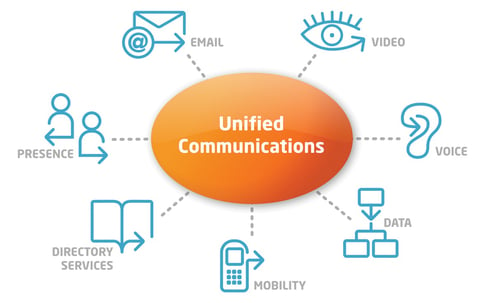 The term unified communications may sound rather mysterious, like some all-powerful method of magically unifying all your emails, phone calls and instant messaging into one effortlessly accessible place.
The term unified communications may sound rather mysterious, like some all-powerful method of magically unifying all your emails, phone calls and instant messaging into one effortlessly accessible place.
And it is just that! Unified Communications is about connecting different communication mediums, but it isn’t that mysterious. Rather it is practical, efficient and something every business needs.
The definition of unified communications is:
The integration of real-time, enterprise, communication services such as instant messaging (chat), presence information, voice (including VoIP business phone systems & IP telephony), mobility features (including extension mobility and single number reach), audio, web & video conferencing, fixed-mobile convergence (FMC), desktop sharing, data sharing (including web connected electronic interactive whiteboards), call control and speech recognition with non-real-time communication services such as unified messaging (integrated voicemail, e-mail, SMS and fax). UC is not necessarily a single product, but a set of products that provides a consistent unified user-interface and user-experience across multiple devices and media-types.
Yet even with a very long definition, unified communications is not a complex concept. Unified communications is getting an email notification of your office phone's voicemail. It is being able to click to call in your CRM platform and have records of callers pop up instantly when the phone rings. It is being able to see whether your colleagues are online or on the phone. It is being able to send and receive fax via email. It is having all your devices ring simultaneously, including your personal smartphone, when someone calls your office number. It is, as the last sentence of the definition explains, not one all powerful application, but rather a set of products that provide a unified user experience across multiple devices and media-types.
But as companies like Mitel acquire Polycom, in a deal that was only announced last week, we will see this change. Telecommunications mergers, collaborations and acquisitions will bring multiple technologies together. Once disparate applications, connected only by a clunky code and APIs, will become genuinely unified, owned and supported by one company, united on one platform.
For example, while Mitel and Polycom both compete in the broader unified communications industry, there is surprisingly little overlap in products or market. Polycom is one of the leaders in videoconferencing solutions and SIP-based phones used primarily by internet telephony service providers (ITSP) like VTSL, and with Microsoft Skype For Business. Mitel on the other hand, has a more traditional UC approach and offers a complete line of products, including its own call control.
As one entity however, we can expect there to be huge collaboration, if not an outright combining of certain product suites for a mega-unified communications platform. What has been u-n-i-f-i-e-d communications, with different communications mediums and device types will become UNIFIED communications
As Polycom wrote in their press release, “The communications and collaboration industry is undergoing a period of intense change that is rapidly redrawing the competitive landscape and breaking down barriers between previously discrete markets and technology domains.”
For now though, with barriers as they are, unified communications is still an amazing way of connecting different comms channels within your business so that people communicate more, and more easily. Which can only be a good thing.
In the words of Paul J. Meyer, “Communication – the human connection - is the key to personal and career success.”
About VTSL
VTSL is a hosted communications provider specialising in VoIP business phone systems and key elements of unified communications. As one of the first to market with a VoIP business phone system that guaranteed voice quality nearly 10 years ago, VTSL has remained on the cutting edge of communications and collaborative technologies. For advice on how unified communications can help your organisation, contact VTSL on 020 7078 3200.

